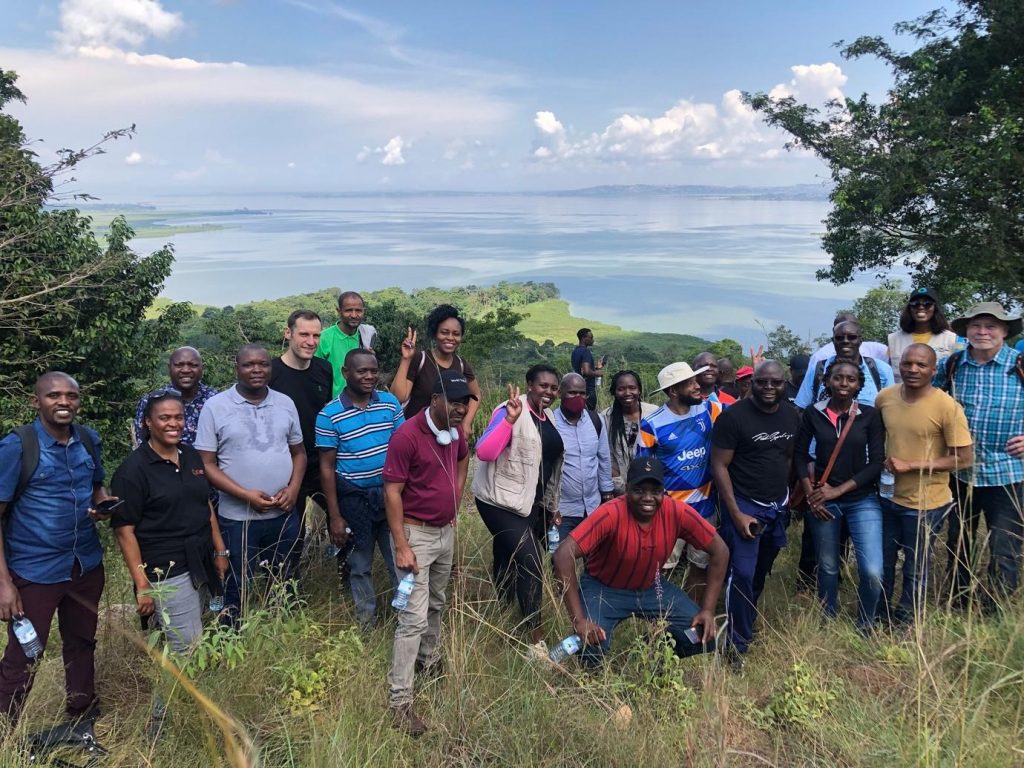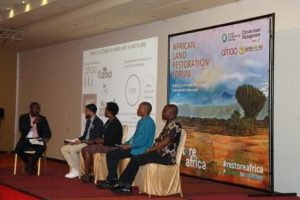Following the massive success of the launch of Restore Africa in Kenya, the Alliance held the African Land Restoration Forum in Uganda in June. Designed to bring together key stakeholders to plan a road map of restoration ahead of COP27, the Forum was attended by representatives from 11 African Governments, global and local NGOs, corporate investors and donors.
The Global EverGreening Alliance’s Restore Africa Programme (funded by Climate Asset Management and directly supporting the aspirations of AFR100) is one of the largest carbon based programmes in the world and will accelerate and massively scale-up the adoption of contextually appropriate agroforestry practices, whilst drawing down and storing carbon in the landscape across the East and Southern African Region.
The Forum, held at Speke Resort, began with a field trip to Kyagwe in the Mukono District. Involving a somewhat challenging hike that tested the resolve (and humour) of the attendees, the trip set the tone for the rest of the event – don’t give up! We can do this!
In Kyagwe, participants were able to see first hand the effects of land degradation (where parts of an indigenous forest had recently been cleared for agriculture) but also the impact and work of the smallholder farmers. This was followed by lunch at Serenada Eco Resort run by retired Diplomats, Ambassador Ibrahim Mukiibi and Mrs. Harriet Mukiibi.
The keynote address at the opening session was delivered by High Level Climate Champion, Nigel Topping, who praised what he called the ‘radical collaboration’ between the Alliance, NEPAD and CAM (as investor) and emphasized the importance of the involvement of Government to meet the challenge of land restoration.
Valence Arineitwe, Prinicipal Forestry Officer, Ministry of Water and Environment of Uganda, referred to the previous day’s hike during his welcome, remarking that he was happy everyone had made it to the top and that no one had given up. “You can’t tell the impact such a simple task can have”. Going to the top was an indication that we are ready for a bigger challenge, he said.
“we also recognize the fact that we can’t do it alone and we are open to both national and international organisations with something to contribute to the achievement of our [land restoration] goal”.
“To deliver the sort of sustainable or transformative impact that vulnerable, rural communities require, these scattered pilots need to be scaled-up and out and this is doubly true if we want to deliver against the targets of the AFR100 by 2030 and if we want to contribute meaningfully to mitigating the impacts of climate change” said Global Evergreening Alliance, CEO, Chris Armitage.
In particular, the Forum intended to build the capacity of all key stakeholders to make appropriate informed decisions in relation to private sector investment in voluntary carbon projects and the handling of Article 6 of the Paris Agreement. It also placed particular emphasis on the creation of a dialogue where governments can actively work towards creating enabling environments for the scaling of restoration efforts.
Caroline Von Tilborg, Carbon Manager at Climate Asset Management noted “also due to the fact that under the Kyoto Protocol, land based activities were not really supported. In the Paris Agreement there is far more emphasis on the role that nature plays in order to reap the targets under the Paris Agreement.”
Mamadou Diakhité, Acting Head of Environmental Sustainability Division (ESD), Manager of the AFR100 Secretariat Union Development Agency AUDA-NEPAD said “the element of carbon should not come before livelihoods”.
The Forum ended on a high with the unanimous commitment to work together on a proposal for a MASSIVE land restoration programme that would cost around $1 billion and potentially transform the lives of 60 million people!
As Mr Arineitwe remarked at the beginning of the Forum, getting as far as we have indicates we are ready for bigger challenges. We cannot give up.
Together we can!



